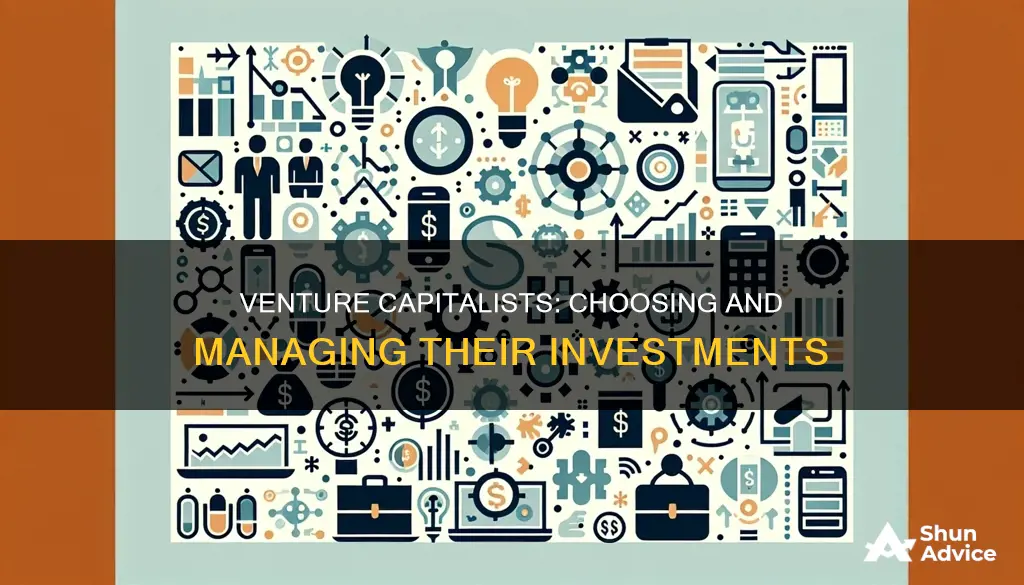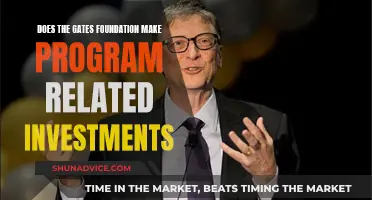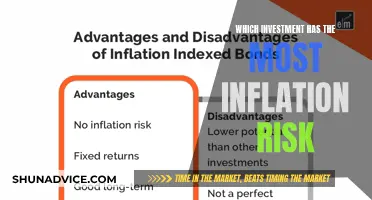
Venture capitalists (VCs) are investors who provide capital to companies with high growth potential in exchange for an equity stake. They are known for making large bets on new start-up companies, hoping to hit a home run on a future billion-dollar company. VCs look for a strong management team, a large potential market, and a distinctive product or service with a solid competitive advantage when deciding where to invest. They also consider the industry, business model, market size, and risk involved. VCs play a crucial role in the economy by financing high-growth start-ups and adding value to portfolio companies through strategic guidance and mentorship. They aim for high returns on their investments, typically targeting a return of at least 10 times their initial investment over five to seven years.
| Characteristics | Values |
|---|---|
| Management team | Experienced, qualified, accomplished, and capable of executing the business plan |
| Business concept and plan | A great product with a competitive edge that solves a real problem |
| Market opportunity | Large, addressable market with the potential to generate $1 billion or more in revenue |
| Risk judgement | Regulatory or legal issues, product relevance, funding, and exit strategy |
| Deal sourcing | Networks, entrepreneurs, and sorting through opportunities |
| Investment selection | Attractiveness of the market, strategy, technology, product/service, customer adoption, competition, deal terms, and quality and experience of the management team |
| Deal structure | Syndication, sharing risks, building reputation, reducing capital constraints, and gaining complementary expertise |
| Post-investment value add | Active investors who add value to portfolio companies by improving governance, structuring boards of directors, and helping to hire outside managers and directors |
What You'll Learn

Management team
The management team is the most important factor that venture capitalists (VCs) consider when deciding whether to invest in a company. VCs invest in a management team and its ability to execute the business plan. They look for experienced, qualified people who will play central roles in the company's development.
VCs are not looking for "green" managers; they want executives who have successfully built businesses that have generated high returns for investors. A company seeking venture capital investment should be able to provide a list of talented managers. If the company lacks such managers, VCs may expect it to be willing to hire them from outside.
A Stanford survey of VCs revealed that, on average, 100 companies are considered for every company that receives financing. For a company to receive financing, it must demonstrate an excellent management team, a large potential market, and, most importantly, high growth potential.
VCs are compensated through a combination of management fees and carried interest (often referred to as a "two and 20" arrangement). Quarterly payments are made by limited partners (LPs) to the fund's manager to pay for the firm's investment operations. In a typical VC fund, the general partners receive an annual management fee of between 2% and 2.5% of the committed capital.
Building an Investment Portfolio: A Beginner's Guide
You may want to see also

Business concept and plan
When considering a deal, venture capitalists will assess the business concept and plan, looking at the market attractiveness, strategy, technology, product/service, customer adoption, competition, deal terms, and the quality and experience of the management team.
The business concept and plan are crucial for venture capitalists (VCs) in deciding whether to invest in a company. VCs are known for taking on significant risks by investing in new start-up companies, hoping that they will become extremely successful. Therefore, they carefully evaluate the business concept and plan to ensure that their investments have high growth potential and will generate substantial returns.
Market Attractiveness and Size
VCs look for businesses that target a large and addressable market opportunity. They typically define "large" as a market capable of generating $1 billion or more in revenue. A bigger market size increases the likelihood of a trade sale, making the business more appealing to VCs seeking potential exits for their investments. VCs expect business plans to include a detailed market size analysis, presented from both a "top-down" and "bottom-up" perspective. This includes third-party estimates from market research reports and feedback from potential customers, demonstrating their willingness to purchase the product.
Product/Service and Competitive Advantage
VCs seek to invest in exceptional products and services with a long-lasting competitive edge. They look for solutions to pressing problems that haven't been effectively addressed by existing companies in the market. They want products or services that become essential to customers, either because they are significantly better or substantially cheaper than the competition. VCs also consider the number of direct competitors in the market, as fewer competitors enhance the investability of the business.
Management Team
While the business concept and plan are critical, the quality of the management team is often the most important factor for VCs. They invest in the team's ability to execute the business plan effectively. VCs prefer experienced executives with a proven track record of building successful businesses and generating high returns for investors. Start-ups seeking VC investment should be able to present a list of qualified individuals who will play central roles in the company's development.
Strategy and Financial Projections
VCs also evaluate the company's strategy and financial projections. They want to understand the business model, revenue streams, and growth prospects. While VCs are comfortable with the uncertainty associated with early-stage investments, they still want clarity on the business's accomplishments and future milestones. This includes assessing potential regulatory or legal issues, the relevance of the product in the current and future markets, and the financial viability of the opportunity.
In summary, VCs carefully scrutinize the business concept and plan when deciding whether to invest in a company. They focus on the market opportunity, the uniqueness and competitiveness of the product or service, the strength and experience of the management team, and the overall strategy and financial projections. By thoroughly evaluating these aspects, VCs aim to make informed investment decisions and maximize the potential for successful outcomes.
Diverse Portfolios: Smart Investing for Long-Term Success
You may want to see also

Market opportunity
When evaluating market opportunity, VCs will consider the total available market (TAM), market share, and market value. They will also look at the company's customer acquisition strategy and plans for scaling up. It is important for startups to demonstrate that they are targeting a large, addressable market. VCs want to see a product with the potential to become indispensable and with a broad appeal beyond a niche market.
In addition, VCs will assess whether the company's product solves a problem that many companies or individuals encounter. The bigger the impact on their lives or businesses, the better. For example, customer relationship management (CRM) software can be essential for a sales-oriented business, whereas a Slack plugin that lets employees add text to gifs is less likely to be seen as a necessity.
VCs also tend to look for companies operating in industries with which they are familiar or have expertise. This allows them to better evaluate the market opportunity and potential for success.
Strategies for Allocating Your Investment Portfolio Wisely
You may want to see also

Risk judgement
VCs conduct thorough due diligence, scrutinising the management team, business concept and plan, and market opportunity. The management team is often considered the most important factor, with VCs seeking experienced and accomplished executives who have successfully built and grown businesses in the past. VCs also assess the business's accomplishments and future milestones, considering potential regulatory, legal, and timing issues.
When evaluating the market opportunity, VCs look for large, addressable markets with the potential to generate $1 billion or more in revenue. They conduct a detailed market size analysis, considering both top-down and bottom-up approaches, and assess customer feedback and willingness to pay for the product.
To further minimise risk, VCs structure their deals to protect their financial interests. They may use contractual rights such as liquidation rights and control rights to ensure they have leverage if the entrepreneur underperforms. VCs also syndicate around 65% of their investments, partnering with other VCs to share risks, build reputation, and gain complementary expertise.
While VCs are attracted to high-risk investments, they employ careful judgement and strategic deal-making to improve their chances of success.
Understanding SAP's Portfolio Investment Strategy
You may want to see also

Deal sourcing
When evaluating potential investments, VCs consider various factors, including the quality and experience of the management team, the attractiveness of the market, strategy, technology, product or service, customer adoption, competition, and deal terms. The importance assigned to these factors may vary depending on the stage of the investment, with early-stage investors focusing more on the team and product or technology, while late-stage investors emphasise valuation and business models.
VCs aim to invest in companies with strong management teams, large potential markets, and unique products or services with a solid competitive advantage. They also seek opportunities in industries with which they are familiar and where they can acquire a significant ownership stake to influence the company's direction.
The deal sourcing process involves sorting through numerous opportunities and making informed decisions about which investments to pursue. It is a critical aspect of VC firms' activities and plays a significant role in their overall success.
Tracking Savings and Investments: Quicken's Smart Money Management
You may want to see also
Frequently asked questions
Some of the key factors that venture capitalists take into account include the quality and experience of the management team, the attractiveness of the market, the product or service being offered, customer adoption, competition, and the business model and strategy.
The process typically involves screening a large number of companies, evaluating their investment potential based on various criteria, and then making a small number of investments. Due diligence is also an important part of the process, which involves a thorough investigation of the company's business model, products, management team, and operating history.
Venture capitalists strive to add value to their portfolio companies by providing strategic guidance, helping with hiring decisions, and connecting them with potential partners and customers. They also play an active role in monitoring the progress of the funded company and may provide additional funding in rounds.
Venture capitalists typically exit their investments after a period of four to six years through a merger, acquisition, or initial public offering (IPO).
Venture capital can provide startups with the necessary capital to bootstrap their operations and scale their growth. It also offers mentoring and networking opportunities, as well as credibility and validation. However, a potential downside is that the startup may lose creative control and equity to the venture capitalists, who may prioritize their financial interests and short-term gains over the long-term success of the company.







